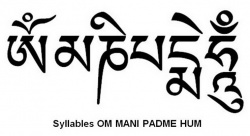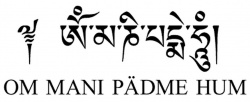Om Mani Padme Hum
Om mani padme hum is the most important mantra in Buddhism.
It is the six syllable mantra of the Bodhisattva of compassion, Avalokiteshvara.
The Dalai Lama is said to be an incarnation of Avalokiteshvara, so the mantra is especially revered by his devotees.
The basic English translation of Om mani padme hum is "Om Jewel in the Lotus Hum" or "Praise to the Jewel in the Lotus."
However, the meaning and significance of the six Tibetan syllables have been interpreted in a variety of ways.
One common interpretation is that each syllable corresponds to one of the six realms of existence and purifies the vice associated with that realm:
Om purifies bliss and pride (realm of the gods)
Ma purifies jealousy and need for entertainment (realm of the jealous gods)
Ni purifies passion and desire (human realm)
Pad purifies ignorance and prejudice (animal realm)
Me purifies poverty and possessiveness (realm of the hungry ghosts)
Hum purifies aggression and hatred (hell realm)
It has also been said that recitation of each of the syllables prevents rebirth in the corresponding realm.
The first known description of the mantra appears in the Karandavyuha Sutra, which is part of certain Mahayana canons such as the Tibetan canon.
In this sutra, the Buddha says:
"This is the most beneficial mantra. Even I made this aspiration to all the million Buddhas and subsequently received this teaching from Buddha Amitabha."
In his book Heart Treasure of the Enlightened Ones, Gen Rinproche says of the mantra:
"The mantra Om Mani Pädme Hum is easy to say yet quite powerful, because it contains the essence of the entire teaching.
When you say the first syllable
Om it is blessed to help you achieve perfection in the practice of generosity,
Ma helps perfect the practice of pure ethics, and
Ni helps achieve perfection in the practice of tolerance and patience.
Pad, the fourth syllable, helps to achieve perfection of perseverance,
Me helps achieve perfection in the practice of concentrationd the final sixth syllable
Hum helps achieve perfection in the practice of wisdom.
So in this way recitation of the mantra helps achieve perfection in the six practices from generosity to wisdom. The path of these six perfections is the path walked by all the Buddhas of the three times.
What could then be more meaningful than to say the mantra and accomplish the six perfections?"
Sources
Meher McArthur, Reading Buddhist Art: An Illustrated Guide to Buddhist Signs and Symbols (Thames & Hudson, 2004), 156.
"Om Mani Padme Hum." Wikipedia, the free encyclopedia.

